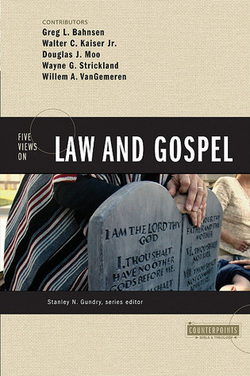 While I was not greatly impressed with a previous "Counterpoint Series" book I read (Five Views on Apologetics), this book was a great surprise and a welcomed read. While there are "five" views, there are basically only two main viewpoints:
The presentations were laid out as follows: Non-Theonomic Reformed View - William A. VanGemeren Theonomic Reformed View - Greg L. Bahnsen Evangelical View - Walter C. Kaiser Jr. Dispensationalist View - Wayne G. Strickland Modified Lutheran View - Douglas J. Moo Overall, every writer was very considerate and kind to the other writers, yet appropriately critical in an academic context while evaluating their differing views. With that being the case, the reader will learn a lot about how different perspectives of the Law and Gospel are understood within the large umbrella of orthodox Protestant Christianity. However, after reading through the book, here is a summary of my findings with each author and their corresponding view:
Non-Theonomic Reformed View - William A VanGemeren VanGemeren presented "basic" reformed doctrine but not with the best writing of it. He was a little confusing and hard to follow sometimes, kind of "eh" on the hermeneutics, and not very clear in his presentation. He definitely did not make any clear case why non-theonomic reformed view should be adopted over against the theonomic reformed view. And he had little to offer when critiquing other views. Theonomic Reformed View - Greg L. Bahnsen Bahnsen gave a solid presentation of the Theonomic View. His article here might actually be one of his best summaries of the how and why of theonomic doctrine (while for a full view - I highly recommend his By This Standard or better yet, his even more comprehensive work Theonomy in Christian Ethics). As always, Bahnsen was very sharp in critiquing other views, and did so graciously. It is interesting to note though that probably the more powerful arguments in critiquing the other non-theonomic views came from Walter Kaiser. Bahnsen did a good job, but Kaiser did even better in the critiques. Evangelical View - Walter C. Kaiser Jr. This was really an amazing presentation. Kaiser used up the least amount of space, wrote very clearly, and got his point across very persuasively. There a few minor problems I have with his proposal: (1) And this might have more to do with the publisher/editor: I have no idea what differentiates "Evangelical View" from a Reformed Non-Theonomic view (especially since it seems most "evangelicals" today have more of an arminian/dispensational slant whereas Kaiser seems to be clearly a five point Calvinist non-dispensationalist); and (2) Kaiser seems very much like a closet theonomist who just doesn't want to be called a theonomist. In his presentation he would consistently try to show that both the ceremonial and civil laws have passed away, while the moral law abides (OT continuity). But every time he proposed that idea, the Scriptures he referenced only pertained to the ceremonial laws. So…he really never gave Biblical credence to the idea that the civil law is now non-binding. With the exception of the theonomic position, in his critiques it would be difficult to say with certainty that he is not a theonomist. Kaiser demonstrated a high regard for the Old Testament Law and a confident view in its continuing abiding character. His critiques of other views were probably the most powerful, succinct, and persuasive of all the other writers. Dispensational View - Wayne G. Strickland While it was an interesting read, I was quite unimpressed with Strickland's presentation of dispensationalism. Throughout his article he contradicts himself (e.g. saying at one point that one cannot divide the law into moral, ceremonial, and civil - and then later on ends up (presumably unintentionally) doing just that), makes otherwise basic concepts of sin, righteousness, and sanctification into complex puzzles (which lead to further contradictions), and often just demonstrates very sloppy hermeneutics. [Don't get me wrong. I love the man as a brother in Christ. But this was just not a great representation of what "Dispensationalism" teaches. His presentation seemed very confused; and I think there are much more able scholars out there who could have better represented it - Charles Ryrie, Stanley Toussaint, etc.] He did have some interesting points when critiquing other positions. But other than that, there wasn't a whole lot he brought to the discussion. Modified Lutheran View - Douglas J. Moo While Moo is unarguably an amazing Biblical scholar, his presentation here of non-continuity between the testaments was not able to stand up against the continuity positions posed by Bahnsen and Kaiser. He wrote well, but his arguments were just not persuasive enough in light of the rest of the book. The same would go for his counter-arguments. Overall, I really enjoyed the book. It's a great reference to different understandings on how protestants view the relationship between law and gospel and a great display of academic interchange among protestant brothers. |
Categories
All
|